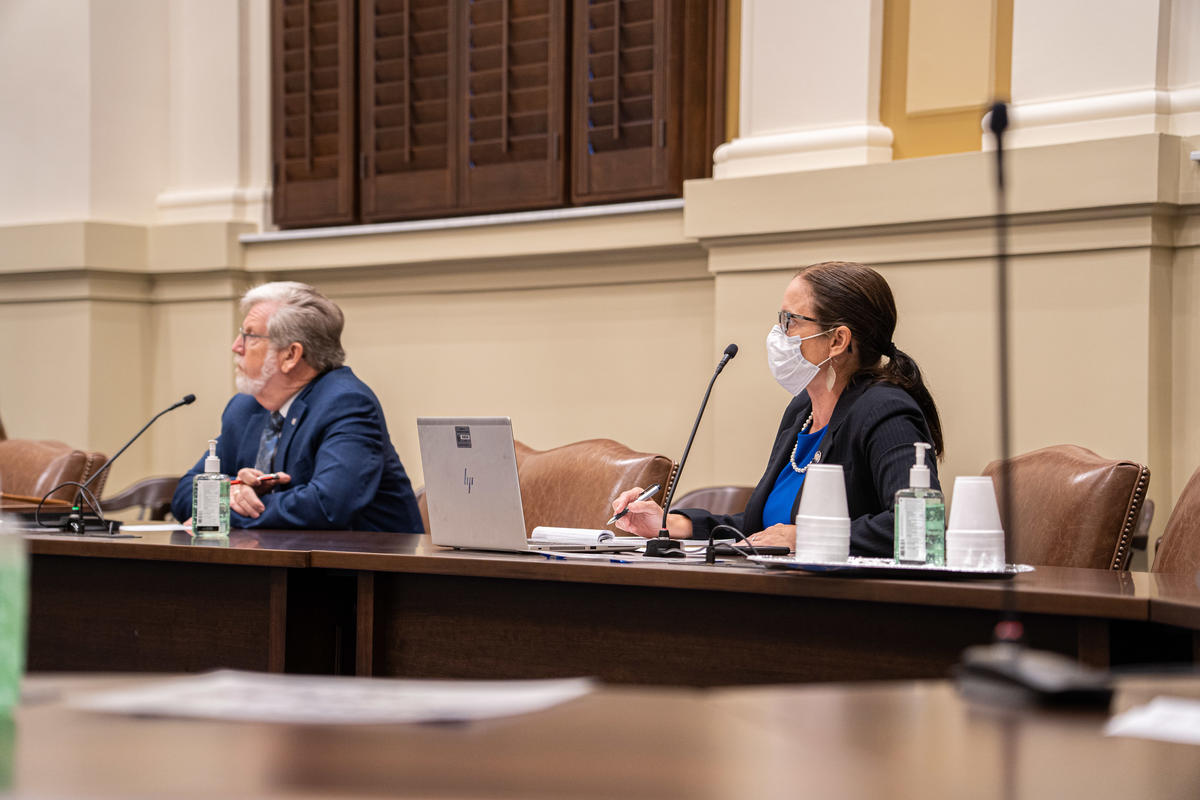Kirt and Thompson study Pay for Success programs
 Sen. Julia Kirt, D-Oklahoma City, and Sen. Roger Thompson, R-Okemah, listen to a presentation during their October 14 interim study.
Sen. Julia Kirt, D-Oklahoma City, and Sen. Roger Thompson, R-Okemah, listen to a presentation during their October 14 interim study.
OKLAHOMA CITY – In a bipartisan interim study hosted by Sen. Julia Kirt, D-Oklahoma City, and Sen. Roger Thompson, R-Okemah, on Wednesday, legislators heard from experts and non-profit leaders about the benefits of Pay for Success programs and how expanding their footprint across the state could save the state millions of taxpayer dollars.
In a framework established by House Bill 2670, Pay for Success programs allow state agencies to establish public-private partnerships that include specific performance targets and outcome measures the private entity must meet in order to receive payment from the state. Common focus areas for these programs include criminal justice, education, early childhood, health, environment, homelessness and workforce.
“We need to focus our state funds on social outcomes that change lives,” Kirt said. “As our state resources are limited, we need to invest in programs that work and reposition government to spend on preventative programs for Oklahomans rather than more expensive consequences, like incarceration, for example.”
The State of Oklahoma has a Pay for Success partnership with Women in Recovery, which is an intensive outpatient alternative for eligible women facing prison sentences for non-violent offenses. The goal of the program is to divert women from incarceration and reduce the recidivism rate while saving taxpayer dollars on years of incarceration expense.
Women awaiting trial or prison time can enter the approximately 18-month intensive program focused on rehabilitation. Upon graduation, women can receive deferred or reduced sentences, and if a graduate stays out of prison for 54 months following graduation, the state pays Women in Recovery for the positive result. According to Ken Levit with the George Kaiser Family Foundation, which committed the funds to start the program, the recidivism rate for the program is only about 6 percent – much smaller than the 23 percent statewide rate.
A second Pay for Success partnership with the Arnall Family Foundation focuses on foster care prevention by connecting therapists with families at risk of losing their children to the foster system. Success payments are triggered when a child is kept out of foster care for at least 12 months following the therapy program. The partnership has an 84 percent success rate with more and more qualified families looking to enter the program.
Both of these proven Pay for Success programs have saved the state millions in taxpayer dollars, and further investment could result in positive outcomes for Oklahoma taxpayers.
These programs are even successful on the county level. Pottawatomie County has partnered with the Avedis Foundation to establish Partners in Caring, which works to improve the health, safety and well-being of children in rural, underserved communities in Lincoln and Pottawatomie counties. Partners in Caring provides on-site, full-time, team-based support to schools and families, including physical, mental, emotional and social services.
“The Pay for Success program unites citizens of Oklahoma who are passionate about serving others, and those who need training and an avenue forward to be able to lead a successful life,” Thompson said. “This program has been one of the most beneficial programs in recent history.”
Kirt said she hopes the state will continue to invest in innovative programs that transform the lives of those who enter them while providing a cost savings to the state.
“As a former nonprofit leader, I know that many resourceful nonprofits serve our state daily,” Kirt said. “Partnering on these and new ideas can have an immediate impact on Oklahoma citizens who rely on their programs while freeing up state dollars to invest in other areas of critical need.”
For more information, contact:
Sen. Julia Kirt at 405-521-5636, or email Julia.Kirt@oksenate.gov.
Sen. Roger Thompson at 405-521-5588 or email Roger.Thompson@oksenate.gov.
 Oklahoma Senate
Oklahoma Senate

